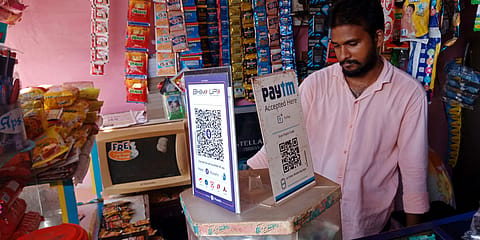Explained: What RBI's new UPI rules mean for linking e-wallets to 3rd-party apps
RBI's latest changes in regulations to allow UPI payments from full KYC digital wallets like bank account holders

To enhance digital payment interoperability and convenience and streamline payment systems, the RBI has decided to enable UPI payments from or to full-KYC Prepaid Payment Instruments (PPIs) or digital wallets via third-party UPI applications like PhonePe, Google Pay, and Paytm, among others.
The move is aimed at facilitating e-wallet holders to make or receive UPI payments through the mobile application of third-party UPI applications.
The move will make transactions smoother, whether it’s paying bills, shopping online, or transferring funds, which is crucial for encouraging wider adoption of digital payments.
As per the current provisions, UPI payments from or to a bank account can be carried out using the UPI application of that bank or of any third-party application provider. However, such payments can only be carried out using the mobile application provided by the e-wallet issuer.
In April 2024, the RBI proposed to permit the linking of digital wallets through third-party UPI applications to enable e-wallet holders to make UPI payments like bank account holders.
Notably, third-party apps are mobile applications like Google Pay or Paytm, which allow payments via UPI and are directly linked to bank accounts via UPI. However, PPIs or digital wallets are issued by these 3rd party companies to store money and it acts as e-wallets like Paytm Wallet, and PhonePe Wallet.
What's changing?
Recommended Stories
The RBI's latest guidelines mean that if someone has a wallet like Paytm Wallet or PhonePe Wallet that has completed full KYC, one can link it to a third-party UPI app and use it to send/receive money via UPI. Here are key points to know:
Previous instructions: According to the RBI's previous instructions, e-wallet holders used to be on-boarded for UPI by their own digital wallet issuer only. Only that e-wallet issuer could link its customer wallets to the handle issued to it. The digital wallet issuer as a payment service provider (PSP) could onboard customers of any bank or any other e-wallet issuer.
Revised guidelines: Now, a digital wallet issuer will enable holders of only its full-KYC e-wallets to make UPI payments by linking its customer e-wallet to its UPI handle. UPI transactions from e-wallet on the issuer’s application will be authenticated using the customer’s existing digital wallet credentials. Such a transaction will, thus, be pre-approved before it reaches the UPI system. An e-wallet issuer, in its capacity as a payment service provider, will not on-board customers of any bank or any other e-wallet issuer.
Previous instructions: Previously, authentication used to be completed by the e-wallet holder as per existing wallet credentials. In other words, a transaction used to be pre-approved before it reaches the UPI.
(INR CR)
Revised guidelines: The revised guidelines say a digital wallet issuer may also facilitate the discovery of its full-KYC e-wallets on third-party UPI mobile applications, who, in turn, will enable such digital wallets to be linked to their payment service providers (PSP) handles. Such UPI transactions, from digital wallets using third-party UPI applications, will be authenticated using the UPI credentials.
What stakeholders say?
Ankush Julka, COO at New Delhi-based digital payments provider Mufin Pay, says the move will brings greater flexibility and accessibility to India’s digital payments ecosystem, and will significantly impact how consumers use digital wallets. "One of the main challenges with PPIs has been their limited compatibility with mainstream banking services and payment platforms. By integrating PPIs with UPI, the RBI has addressed this issue, making it easier for users to link their digital wallets to UPI-enabled apps," says Julka.
Additionally, UPI’s popularity and ease of use is likely to encourage more users to adopt digital wallets, particularly those who were previously concerned about compatibility with existing payment systems.
Julka says this gives a level playing field to companies. "From a strategic perspective, this development helps us attract new users and improve our services. It also levels the playing field for PPI issuers, allowing us to compete more effectively with traditional financial institutions."